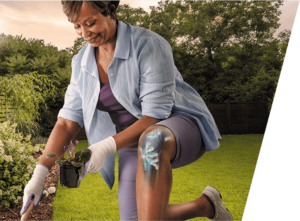September is National Healthy Aging Month, a time of the year when we pay extra attention to the lives and contributions of seniors and the health challenges they face.
OrthoArkansas celebrates this annual occurrence to raise awareness about the positive aspects of growing older.
Promoting health and preventing disease in older Americans is important, because the population of older Americans is growing, and they are living much longer than ever before.
There are 70 million Baby Boomers (born between 1946-1964) and more than 65 million members of Generation X (born between 1965 – 1980) in the United States. Our country’s 65+ population has increased 35% over the past 10 years and is projected to rise an additional 45% by 2060.
Aging well means living well
We have heard a lot about wellness over the past few years—from wellness initiatives in the workplace to all kinds of fitness classes that promise to “restore your wellness.” Healthcare plans emphasize wellness now too—Medicare covers an annual wellness visit as well as a variety of other preventive health services. But how can you implement wellness in your everyday life?
Wellness refers to the quest for a healthy, balanced lifestyle that focuses on both the mind and the body. Wellness also means proactively adopting healthy aging strategies and implementing lifestyle changes that can prevent diseases before they occur. According to the Centers for Disease Control and Prevention, about 80% of older adults have at least one chronic health condition (such as heart disease, stroke, and obesity).
In the words of actor and fitness expert Chuck Norris, “The key to the future in an aging society is not found in increasing just our life span; we need to increase our health span at the same time.” By focusing on preventing diseases and injuries before they occur, people of all ages can live healthier and happier lives.
“If I had known I was going to live this long, I’d have taken better care of myself.” — Anonymous
It is never too late to take control of your physical and behavioral health. Adopting and keeping healthy habits and behaviors such as eating right and exercising, managing health conditions, seeing your healthcare provider on a regular basis, and understanding all your medications can help increase the quality of your life.
Tips for healthy aging
1. Eat and drink healthy
For most adults, consuming at least five servings of fruits and vegetables a day is recommended as well as five to eight 8-oz. glasses of water. Keeping sugar intake low is important, as well as avoiding highly processed foods that contain excessive amounts of sugar, fat, and salt. Try using spices and fresh herbs for flavor in your favorite dishes rather than salt and consider swapping highly carbonated ingredients for their vegetarian version, such as zucchini noodles instead of regular pasta.
2. Move more and sit less
Find an activity that is safe and fun for you, such as walking with a friend, water aerobics, a group dance, yoga, or Tai Chi class. Being active can help you prevent, delay, and manage chronic diseases; improve balance and stamina; reduce the risk of falls; and improve brain health. You can start with just 10 minutes a day, and eventually try building towards 30 minutes or more of daily exercise. Every little bit helps.
3. Get regular checkups
Visit your doctor or healthcare provider for preventive services, not just when you are sick. Regular checkups can help prevent disease or find it early when treatment is more effective.
4. Learn more about fall prevention
Falls are a leading cause of fractures and traumatic brain injuries. Conduct a falls prevention assessment in your home and outdoor areas. Remove loose carpets or throw rugs around your house. Make sure welcome matts and entry rugs are not a tripping hazard. Keep paths clear of clutter, furniture, and electrical cords. Always use a night-light in hallways and bathrooms.
5. Use sunscreen
Many people do not realize that your skin gets thinner and more susceptible to sunburn (and therefore skin cancer) as you age. Each year more than 3.5 million cases of skin cancer are diagnosed in the United States with 90% of these cancers caused by the sun’s ultraviolet rays (UVR). Apply a high SPF sunscreen that protects against UVR rays, and always reapply every few hours.
6. Don’t smoke
Smoking leads to disease, disability, and harm to nearly every organ of the body. Cigarette smoking remains the leading cause of preventable disease, disability, and death in the United States. If you use tobacco, take the first step towards quitting by calling 1-800-QUIT-NOW for FREE help.
7. Stay current on immunizations
We all need immunizations to help us prevent from getting and spreading serious diseases that could result in poor health, excessive medical bills, and not being able to care for family. Stay current on your immunizations such as flu (influenza) vaccines, shingles vaccine, and pneumococcal vaccines.
8. Meditate
Studies show that meditation may prevent mental deterioration, while keeping your brain healthy as you age. Meditation is also a proven way to reduce stress and anxiety, which leads to better overall health and quality of life.
9. Learn a new skill
Try learning a new skill that requires concentration, creative thinking, and memorization, like crossword puzzles, chess, Sudoku or learning a new language. It is never too late to master that skill you always wanted to have—playing a musical instrument or developing an artistic talent. Daily mental exercise helps you stay sharp and prevents cognitive decline.
10. Volunteer
Volunteering a few hours a month is a wonderful way to do something worthwhile for others while making new friends. Find a cause that appeals to you and makes you happy.
“Grow old along with me! The best is yet to be.”- Robert Browning













